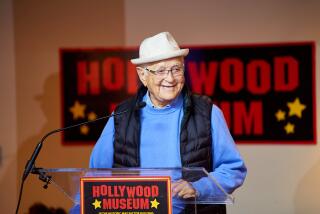Gradually I got used to not working. The guilt disappeared.
- Share via
As a young man in Chicago, Russell Blinick wanted to be a teacher, but he chose to be a chemist because of the higher pay. He has made the transition from working to retirement and now has the satisfaction of being a volunteer teacher. Blinick and his wife, Ruth, a psychiatric social worker, live in Woodland Hills.
I’m 62. I just got my first Social Security check. It’s a milestone, but it’s also money. That’s good. I guess it means I’m retired.
There are a few sour points when you stop working. I guess it just represents going from working to not working, and that’s it. With me it wasn’t particularly a planned kind of thing.
I guess it was an incident more than anything else on my last job. I felt I had done something rather well, but it was perceived by management 180 degrees from the way I felt that I had done it. That just seemed to be the last straw, and I quit that day. When I told Ruth about it . . . my poor wife. That was about a year and a half ago.
I did some consulting in that period of time and that kind of smoothed the way, both financially and emotionally. It kept me busy, and that’s important because the idleness is a problem. It hits you kind of suddenly. There’s a loss of a whole social aspect of your work that really fulfills a big function in your life. When that’s gone, it’s lonesome. So consulting was partly for money and also for something to do.
Gradually I got used to not working. The guilt disappeared. We all have guilt. It sounds corny, a Judeo-Christian kind of ethic, if you don’t work, you’re lazy. You’re brought up with your parents saying, “You’re not doing anything, go accomplish something.” Just leaning back and listening to some music or reading a book is wrong. It’s naughty. You look around, and somebody’s kind of looking over your shoulder, your mother, your father, your grandfather, God.
So you have to get to that point and say, “Hell, I’m really enjoying this, and it’s OK.” And then you start listening to Schubert trios and you read novels and you know that’s prime, that’s really great. So that’s a part of retirement that’s really good.
Then I got to the point where I wanted to do something and that’s when my wife, Ruth, suggested I see Aletha Ludowitz at RSVP, the Retired Senior Volunteer Program. And I did, and she came up with a lot of suggestions.
I picked up on this Asian program that operates out of the Reseda Senior Citizens Building. So I go there Monday morning, and there are Chinese people coming to learn English.
I teach two Chinese ladies English. There’s a 64-year-old lady and a 74-year-old lady. The 64-year-old is named Yen, and she’s brighter than hell. And Sally, 74, is a jewel. I think Sally is a little bit forgetful, so it’s tough for her. It’s the eagerness. They come every Monday, and I sit with the two ladies.
I get as much out of it as they do. I enjoy them. You can tell that these two ladies are alive. Here they are at this stage of the game learning English. It just never stops for them. They are constantly moving forward.
On Wednesday mornings I help a teacher at the Welby Way Elementary School, a magnet school. So I teach two mornings a week. It’s refreshing in itself, because on Wednesday I’ve got all these bright snotty-nosed kids and they are smarter than hell and Monday morning I’ve got these two ancient Chinese ladies, so it’s kind of fun.
That’s the extent of my giving back to society. Helping other people is important in our family, so that’s what I gravitated toward. It’s something that I feel comfortable doing, and I enjoy it. I get something back.
Now the rest of the time we play a little golf and go to dollar movies on Tuesday night at the Mann Theater. I like retirement, but there’s a vacuum, a little something missing that I haven’t been able to find yet, a real passion for doing something, maybe, that I don’t have in my life.
But it isn’t a big thing. I think that I’m pretty well fulfilled now.
More to Read
Sign up for Essential California
The most important California stories and recommendations in your inbox every morning.
You may occasionally receive promotional content from the Los Angeles Times.













